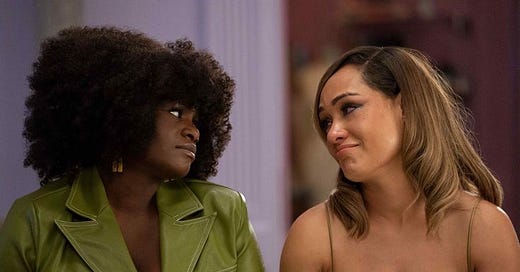On Sisterhood, Friendship Loss, And The Women We Become — Part III
coming to terms with when we fall short as a friend and naming expectations in platonic relationships.
On Sisterhood, Friendship Loss, And The Women We Become is a series exploring the grief of losing friendships and the power that sisterhood and community has in shaping us as women.
I couldn't write about sisterhood and friendship loss without weaving some necessary self-reflection into the topic.
My truth is that I strive to show up as the most intentional and genuine friend for the people in my life. A lot of my labor as a friend goes into creating safe spaces for those whom I care about to be able to show up as their full selves and feel accepted, loved, celebrated, and free of judgement.
When people are in community with me, I want them to know that the heap of their humanness is safe here — be it their joy, their pain, their mistakes, or whatever they may come with. I don’t want them to feel burdensome, but rather know that they have someone willing to help them navigate the burdens of life with grace and compassion.
However, as much as that is the friend I strive to be, I have to acknowledge the fact that I sometimes fall short. Oof. That has been really hard for me to accept and something I have grappled with. Knowing that I sometimes turn out to not be the friend I hoped I was being to others, or to learn that I wasn’t creating a safe space for them to feel accepted and loved and seen and valued and held without judgement is a hard pill to swallow. But it has happened, and I have to accept that at times I’ve unintentionally and unknowingly brought hurt upon people I truly cared for.
Note to self: Sometimes you aren’t the perfect friend, sis. Another note to self: You shouldn’t strive to be, because you are not without flaw.
Though I know there are things about me that maybe I haven’t realized yet or that I still need to take ownership for, here are some things I have learned about myself when it comes to friendships:
My deep concern and care for others can sometimes create an atmosphere of unintended judgement.
My savior complex shows up in friendships a lot (more on that later 🥴), and if I’m not careful or aware, it can cause conflict.
I tend to apply a sense of urgency to others when it comes to dealing with problems. Mainly because I've become a very open communicator over the years, and I don’t tend to allow things to fester or ruminate myself into a place of resentment. I like to get to the root of the problem at the first sign of it. Acknowledging that others aren’t like this, that they may not have the language to name or understand how they feel, that they may not feel comfortable with or have an understanding of or even care about communicating through conflict in a healthy manner has taken a lot of patience and grace from my end. I’ve been learning that my urgency does not have to be another person’s urgency, and that I must respect the timing in which they choose to address things, even if unfavorable. I find that my sense of urgency when dealing with conflict also stems from my desire for others to be up front if they have a problem with me. When they aren’t, it makes me feel like they don’t believe I’d hold space for that and be willing to navigate through the problem, even if it may be uncomfortable or challenging. What I realized I don’t have the tolerance for is the emotional manipulation of making someone play a guessing game while ones’ words and actions don’t match.
(who recently wrote a vulnerable piece about friendships) actually broke it down in a note: This is called relational asymmetry, and I hate it so much. I’ve often found myself in positions where, as an empath, I can sense when someone’s energy toward me has shifted or when they’ve emotionally checked out. But instead of addressing it, they pretend everything is okay, leaving me to be the one to perform the emotional labour of sensing the weight of the unspoken tension. The emotional toll of constantly being the one to “sense and carry” is exhausting. It is. But still, as I’ve learned, you can’t force someone to name what they aren’t ready to, what they aren’t willing to, or what they don’t even have the language for.
When I fall short of making a safe space for those I hold close, I beat myself up over it. But I have to take the expectation off myself that I am going to hit the mark every single time. Again, you’re not the perfect friend, sis. You’re the true friend — and that means your humanness is going to be present, so mistakes will be made at times and you will fall short.
Taking ownership for the part we have played and coming to terms with when we fall short in friendships, or any relationship, is necessary. Uncomfortable, yes, but necessary.
I value my friends speaking up about when I’m not showing up for them how they need me to, or putting me in check if need be. But in wanting to create safe spaces for those I care about, I also have to make sure that I create a space where they feel safe enough to address any problems that may arise.
One of my friends suggested having a word in place for when one of us feels like the other is crossing a boundary, giving off unsolicited advice, or simply just doing too much. The word is said, we take some time to process it, and then we navigate it. That’s not the case for all my friendships, but it’s a forward act of creating safe grounds to navigate conflict.
Along with doing that, what I do more of now is assess my friendships. I check-in from time to time with questions like: Am I showing up how you need me to? How do you want or need me to support you right now? Are there any ways I can be a better friend?
And I am vulnerable in this way as well. If I feel like I need more support from a friend, I say so. If a friend has hurt me, I address it as lovingly as I can. If a situation occurs where there’s an expectation I realized I have for a friend that I never expressed, I tell them.
I think this also calls out the topic of sharing expectations within our friendships, which is something that the consensus seems to agree we often shy away from within platonic relationships. However, naming the expectations is crucial because it creates grounds for clear understanding of what each person needs from the friendship.
It also helps to put healthy boundaries in place, which is important when it comes to navigating conflict and something that helps prevent resentment. It also helps us to understand each other’s capacity in how we are able to show up — which likely will change from season to season in our lives (hence why I believe the check-ins are beneficial).
We expect people to know how to show up for us and tend to us without ever having said a word. We expect them to respect our boundaries without ever having told them what our boundaries are. We expect them to not trigger us without ever having revealed to them what our triggers or traumas are.
It’s important to name the expectations. And it’s important to take off the pressure of being “perfect” in friendships. We will fall short. We will miss the mark. The beauty, however, lies in how we are able to navigate through when we do.
Reflect with me:
How do you handle when you fall short as a friend?
How do you create safe spaces to handle conflict in friendships?
Are you comfortable with naming your expectations in friendships? Why or why not?
More From This Series:
Part I: Can We Talk About Friendship Breakups?
Part II: Seasons of Interludes and Rediscovery








Thank you for this Mariah.
Your level of self-introspection and honesty with yourself is so admirable.
This has been such a balanced series of reflections where yes, we name the ache of how friendships may have let us down while simultaneously also naming all the ways we may have failed the people we are in community with.
Honoured to be mentioned alongside such poignant reflections 🤎🙏🏾
This was deeply felt. Your writing carries a soft strength that lingers—grief, friendship, and memory all wrapped in grace. Thank you for sharing your heart.